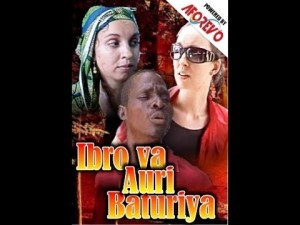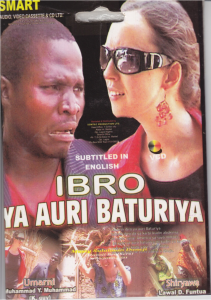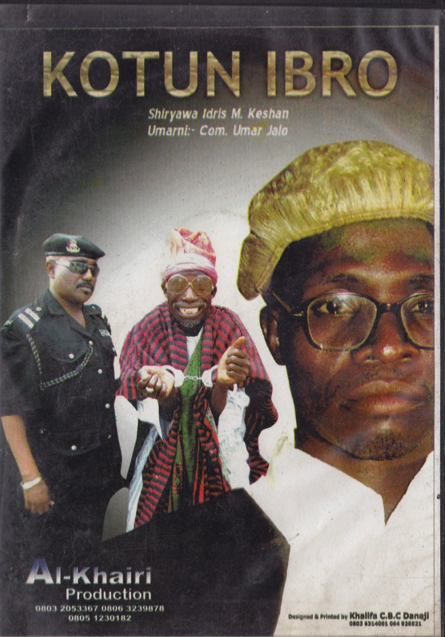This morning, I yielded to the temptation to go onto Facebook before starting my work. I found waiting for me a private message from a friend telling me that Rabilu Musa aka ‘Dan Ibro, the most famous comedian and perhaps the most famous actor in the Hausa film industry, had just passed away.(BBC, Premium Times, RFI). He was only in his forties. Inna Lillahi wa inna ilaihi raji’un.

Dan Ibro praying (courtesy of Rabilu Musa DAN Ibro Facebook page)
It is a gutting loss to the industry and to millions of people all over northern Nigeria, who laughed at Ibro’s antics even as the bombs were exploding around them.
—
An explanation:
I’ve been gone from this blog since June, since even before then, really, as I tried to reduce distractions to a bare minimum while I pushed out the PhD. I kept up with the column at Weekly Trust until August. A week before my revisions were due, I desperately asked my editor for a month break, which he graciously granted me. I finished the PhD and then just kind of collapsed. I had been taking two days and an all nighter every week trying to write my weekly column. I had written throughout the last four years of my PhD programme, even through the defense. But with the kidnap of the Chibok girls and ever more atrocities coming out of the northeast, sometimes venturing further West, I felt like I couldn’t write about anything else. How can you write about novels and movies and walks in pretty American parks when ethnic cleansing is going on—when perhaps some of your readers have been killed in the violence? My one-month break turned into many months. I got busy applying for academic jobs and going to conferences and travelling back and forth to Nigeria. I pushed away thoughts of the column. I couldn’t handle the thought of having one more deadline every week or of having to write anything else while people were being murdered and bombs were going off.
—
Then ‘Dan Ibro died.
And I realized he made people laugh in the midst of all of these horrors (In October there was even a Ibro Likitan Ebola poster floating around on Twitter), and that perhaps it is this laughter, these stories, these songs, these dreams of ordinary people in ordinary and extraordinary times, that are what help us

Ibro Ebola Doctor (courtesy of Kannywood Exclusive TL: https://twitter.com/kannywoodex/status/504397310957457408 )
survive. We shouldn’t allow Boko Haram or any other threat to take laughter and story and song away from us. During the Jos crisis of 2008, dozens of people sought refuge in our house. One night, I brought out my vcd of Ibro Dan Siyasa [Ibro Politician], and everyone, all crammed into our parlour, sat there laughing. Christians in Jos laughing at the Muslim Ibro’s comedy, in the midst of a religious/ethnic/political crisis. I thought, then, that there is a bridge here, this Kannywood, this comedy, there’s something here that goes beyond the bitter statements I’d heard from Christian refugees throughout the crisis. The same people who had cursed “the Hausa” and cursed “the Muslims” were laughing at ‘Dan Ibro. His comedy was bigger than fear and hatred and politics.
So here are my own memories of Ibro.
Like any fan, I have watched dozens of his films—playing in the background on Africa Magic Hausa as I would write in my room or in the little kiosk where I bought yoghurt and bread when I lived in Kano. I’d watch short comedy sketches excerpted from his longer films that musicians and filmmakers would show me on their phones in studios. Sometimes I’d peek over the shoulders of strangers in taxis giggling at an Ibro sketch on their phone.
When a director and producer I did not know approached me on Zoo Road with the idea for Ibro Ya Auri Baturiya, I laughed and agreed without too much further thought. I liked the idea. I said I would do it, if I could get an interview with Ibro. The producer agreed.

One of the vcd covers for Ibro Ya Auri Baturiya (more coming once I can find my hard copies in the various boxes where they are packed)
Ibro Ya Auri Baturiya was made in early 2009, in the midst of the Kano State Censorship crisis. Because of the crisis, we had to leave Kano to shoot the film. We met up with Rabilu Musa on the outskirts of Kano, and I rode in the back seat of his car as he drove towards Jigawa State. He was dressed in a normal white kaftan, and without the bright signature costume, the tall red cap or the comedian’s grin, he looked like an ordinary person—not one of Nigeria’s biggest stars. He was very quiet and did not say much as we drove. Even with all of my exposure to Kannywood, I remain bashful in the presence of fame. I hoped for an interview but didn’t quite know how to ask him. We stopped once on the side of the road, perhaps to buy snacks, and people passed without recognizing him until some of the children did a double take and then started chanting “Ibro, Ibro.”
We arrived at a village a little bit outside of Dutse in Jigawa, and we ate lunch before starting to shoot. I was still too shy to talk to him, as you can see from the below photo of me grinning like an idiot while Ibro eats in the background. But the director fulfilled his part of the bargain, and we had a brief 6-7 minute interview. I tried to ask him about his ordeal the year before, at the hands of the Kano State Censorship Board. He didn’t want to talk about it. I got what I could. (I’ve transcribed the Hausa, though I haven’t yet translated it, and will post it later on this blog).
Then it was time to act. I was led to a small, borrowed room in someone’s compound and told to change into my “Western dress”. About a minute later, before I had a chance to smooth down my hair still flattened from my headtie, I was rushed out to do the first scene where I drag (my own) suitcase into the village with Ibro, asking him why we aren’t going to Abuja as he promised me. There was no script. At least none that I was given. The director gave us a minute of instruction (I was to speak in English at first and later in broken Hausa), and we were off. Ibro is a brilliant comedian and knew exactly what to do. I just tried to keep up.
That day, Ibro had somewhere else to be. I completed my scenes with him, a few more were cut, perhaps, and he rushed off to his next film. We continued with Baba Ari, ‘Dan Auta, and the others at a more leisurely pace.

On set of Ibro Ya Auri Baturiya.
Left to right. Director Muhammad Y. Muhammad, Baba Ari, me, Dan Auta, Producer Lawal D. Funtua.
After production, I was embarrassed. I felt I had acted terribly. I felt like if produced differently it could have, perhaps, been funnier. I never mentioned the film on this blog and rarely elsewhere, because I didn’t want people to see me in it.
But on the streets, people would call out “matan Ibro,” “matan Ibro.” People would jokingly ask me how my husband Ibro was. And so it was that “matan Ibro” became part of my public persona, even though I was still too shy to talk to him.
Eventually, I was able to overcome my embarrassment enough to watch parts 1 through 3 of the Ibro Ya Auri Baturiya and to look at it with enough distance to include an analysis of it in my PhD dissertation. I realized that it didn’t matter how I acted. It wasn’t about me. The baturiya was just a symbol to be played with and mocked—some of the funniest scenes were discussions of the baturiya, where I did not appear but which were made possible by my token appearance elsewhere: the baturiyar kwantainer, Ibro could not pass off to his friend once I became a nuisance because he claimed he had gotten me from a container, which could have come from Togo or Benin, rather than America; the baturiya whom Ibro really “made suffer” as people on the street would laugh to me.
Ibro Ya Auri Baturiya was where I most connected with Rabilu Musa, but he had many more brilliant films. They weren’t usually polished, but they were usually hilarious and filled with sometimes biting political humour. The character of Ibro took on a life of his own. His voice often imitated by singers, including Sadi Sidi Sharifai, so that the character Ibro became disembodied from the actor himself. I mention him over 40 different times in my PhD thesis, and do an extended analysis of his film Kotun Ibro, a sly dig at the mobile court which persecuted so many filmmakers during the censorship crisis.
Dan Ibro was an institution. He has become an era.
He will not act in any new films, but he will stay with us in a thousand different comedies. I heard his voice singing on the radio today, as a broadcaster mourned him. He brawls and weeps and shouts and complains and dances on a million different screens. We will keep laughing, even when, perhaps, we should be crying.
Allah ya jikansa, Allah ya sa shi huta. Yaba mu hakurin wannan babban rashi.
Postscript
As I wrote this today, I saw the news of another bomb in Kano at the Kwari cloth market. Allah ya kiyaye mu. What a horrible day Kano has had.
Sometimes it’s overwhelming to contemplate how many people from the Hausa film industry have died in the past few years. Here are my tributes to a few of them.
Actress Hauwa Ali Dodo (Biba Problem), who died 1 January 2009,
Director Zilkiflu Muhammed (Zik), who died 18 February 2010,
Actress Safiya Ahmed, who died on 26 February 2010,
Actress Amina Garba, who died on 21 November 2010,
Comedian and director Lawal Kaura, who died on 13 December 2011,
Actress Maryam Umar Aliyu, who died on 12 April 2011,
Director Muhammadu Balarabe Sango, who died on 1 December 2012














Thank you very much. I am still waiting for you for an interview please. Thanks
LikeLike
Ibrahim, sorry, I’ve been out of my mind with busyness. Please send an email to me at carmenmccain at yahoo, and I’ll send you my phone number.
LikeLike
Dear Dr, thanks for your post on Ibro and a very touchy comment on the late ibro.I was wondering why you stopped writing your weekly column and had asked you recently only for you to come up with an answer on this new post.Thanks and hoping to here from you soonest. Regards Shehu.
LikeLike
i would love to read your dissertation..
LikeLike
@Mustapha, thanks for your comment. I think that after finishing the PhD, I just needed a break from everything for a while (and there are also now the pressures to spend more time writing for the much smaller academic audience), but I hope to start writing more regularly again soon.
@yadomamandara My PhD is currently not publicly available because publishers generally will not accept a manuscript that is already out there, but you can take a look at my TOC and other articles here at academia.edu, and I’d be happy to send you chapters or articles you are interested in. Contact me at carmenmccain at yahoo.com: https://wisc.academia.edu/CarmenMcCain
LikeLike
innanillahi waina illaihi rajiun
wat a shock
rabilu musah aka dan ibro has died he is 44 years of age with 15 children
LikeLike
wat a shock dan ibro he is 44 years with 15 children
LikeLike
Pingback: My memories of Dan Ibro in Weekly Trust today | A Tunanina...
Na ji dadin haduwa da ke a wannan dandali. Ina ci gaba da samun “references” daga blog dinki da rubuce-rubucenki. I discovered that you’re among the few but top pioneer writers on Hausa Culture and Films combined.
A kan abin da kika yi digiri na 3 no kuma nake son yin digiri na 2. My topic is:
“Hausa novel and Hausa Films: Its Influence to Society”
I will like to meet you if you arrive to Nigeria. Allah Ya taimaka.
Thanks.
LikeLike
Malam Hasheem,
Allah ya ba da sa’a da MA naka. Zan ji dadin karanta shi in ka gama.
LikeLike
Thankful for seeing your post, I am waiting for your interview thank you
LikeLike
Pingback: The ‘second coming’ of Kannywood | A Tunanina...